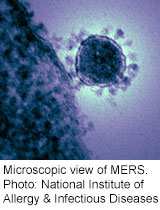- The Best Time of Day to Drink Bone Broth to Maximize Health Benefits
- 8 Ways to Increase Dopamine Naturally
- 7 Best Breads for Maintaining Stable Blood Sugar
- Gelatin vs. Collagen: Which is Best for Skin, Nails, and Joints?
- The Long-Term Effects of Daily Turmeric Supplements on Liver Health
- Could Your Grocery Store Meat Be Causing Recurring UTIs?
- Are You Making This Expensive Thermostat Error This Winter?
- Recognizing the Signs of Hypothyroidism
- 10 Strategies to Overcome Insomnia
- Could Artificial Sweeteners Be Aging the Brain Faster?
CDC: 3rd Suspected MERS Case Was False Alarm


An Illinois man thought to have contracted the potentially fatal MERS virus from a business associate was not infected after all, federal health officials said Wednesday.
The U.S. Centers for Disease Control and Prevention said on May 17 that the unidentified Illinois man had been infected with MERS by a man who brought the first known case of the mysterious respiratory illness to the United States in late April. That first case was a health care worker who had traveled to Saudi Arabia — the epicenter of the MERS outbreak — and returned to the United States before falling ill and being hospitalized in Indiana and later released.
Preliminary tests indicated that the Illinois man had tested positive for antibodies for MERS, formally called Middle East Respiratory Syndrome. Since then, however, CDC scientists tested additional blood samples and found that he was not infected with MERS. So, the Indiana MERS patient didn’t spread the virus to his Illinois business associate, officials said Wednesday.
The second MERS case in the United States involved a 44-year-old health care worker from Saudi Arabia who had traveled to Orlando, Fla., where he was hospitalized and later released.
That means that the MERS virus hasn’t been found in any people who had contact with the two confirmed U.S. cases, according to the CDC. There’s no evidence that MERS has spread in any community setting, the CDC said.
Both of the Americans diagnosed with MERS picked up the infection in Saudi Arabia, where it is endemic.
The health risk from MERS to the general public is very low, U.S. officials have said, because the virus is only passed through close contact.
The MERS virus first surfaced in 2012 in the Middle East, where most of the cases have occurred. As of May 22, 2014, there have been 632 confirmed cases and 193 deaths, according to the World Health Organization.
MERS symptoms typically include shortness of breath, coughing and fever. The illness kills about one-quarter of the people who contract the virus, according to CDC officials.
One-fifth of all MERS cases have occurred among health care workers, CDC officials have said.
In some countries, the MERS virus has spread from person to person through close contact, such as caring for or living with an infected person. But, there’s currently no evidence of sustained spread of MERS in general settings, the CDC has said.
Camels have been identified as carriers of MERS, but it’s not known how the virus is being spread to people.
More information
For more on MERS, visit the U.S. Centers for Disease Control and Prevention.
Source: HealthDay
Copyright © 2026 HealthDay. All rights reserved.










